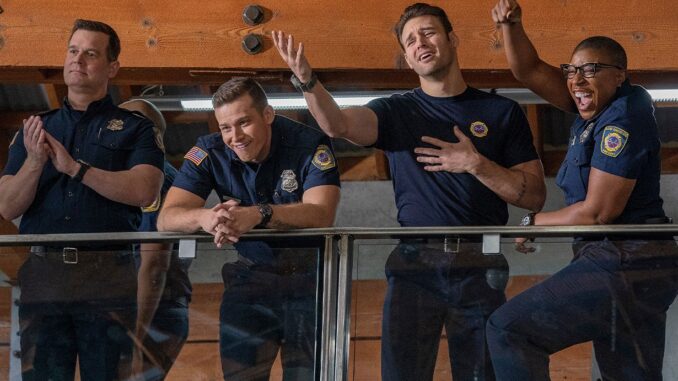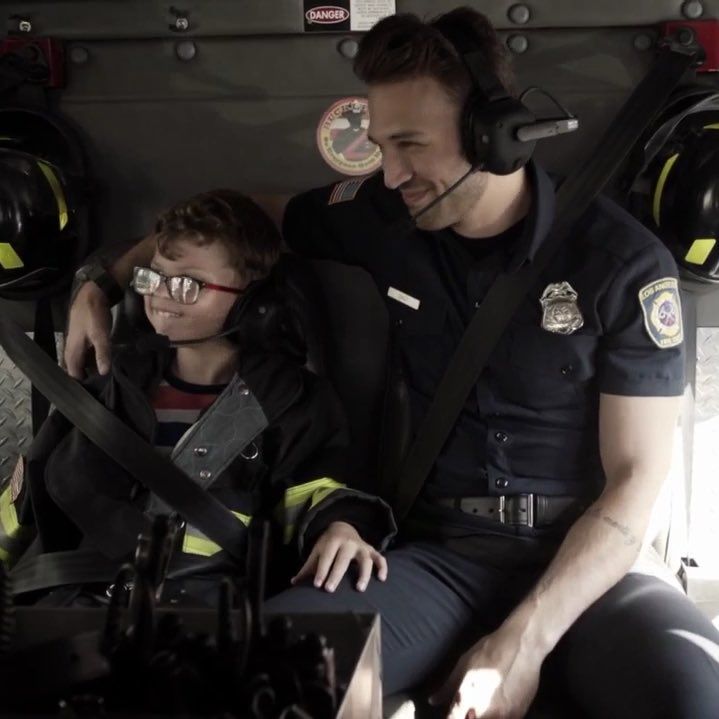
Bobby’s death was devastating, especially considering how he and Athena were optimistically planning their future in 9-1-1 season 8. Yet, it’s Bobby’s past that makes his untimely demise even more difficult to accept. As a pillar of the main cast, Bobby’s detailed backstory has been revealed in pieces over the years and brought unique shadows to his contemporary storylines. Undeniably, the most defining moment of Bobby’s past was when his wife and two children died in 2014— from a fire that Bobby himself was responsible for.
Although Bobby had a history of alcohol abuse, a back injury suffered on the job introduced him to prescription painkillers, leading him to develop a drug addiction that worked in tandem with his alcoholism. One night, Bobby accidentally left a space heater on in an empty apartment before a fight with his wife left him to sleep on the roof. The night proved to be Bobby’s first near-death experience in 9-1-1, as the space heater caused a fire strong enough to engulf most of the apartment building and claim the lives of over 100 people, including his entire family. Bobby then moved to L.A. to be the 118’s captain, but the festering guilt over the apartment fire consumed him.
Throughout the first season of 9-1-1, Bobby had a detailed suicide plan, vowing that he would only take his life after saving 148 people— the same number that died in the fire. To Bobby, death was his fated penance. Regardless of his sobriety or heroic public service, Bobby couldn’t let go of his past. It wasn’t until people like Buck, Athena, Hen, and Chimney intervened that Bobby even realized death wasn’t his only option to move forward and make amends. It makes his tragic death, after he had finally chosen to live, particularly cruel.
Bobby Singer wasn’t just another supporting character on Supernatural. He was the soul of the show. A father figure, a mentor, and the emotional glue holding Sam and Dean Winchester together. So, when the show decided to kill him off, it didn’t just sting—it felt like betrayal. Let’s dive deep into why Bobby’s death was so particularly cruel, especially when viewed through the lens of his complex, heartbreaking backstory.
Who Was Bobby Singer Really?
More Than Just a Hunter
Bobby wasn’t your average monster hunter. He was layered—gruff on the outside but full of heart. He stood as a symbol of unwavering loyalty and emotional intelligence in a show overflowing with testosterone-fueled action.
The Father the Boys Never Had
Let’s be real. John Winchester might’ve been their biological dad, but Bobby was their real father. He listened, supported, and guided them without ever expecting anything in return. That kind of love? That’s rare—especially in a world crawling with demons and death.
Bobby’s Tragic Backstory
Haunted by His Past
Long before demons and angels entered the picture, Bobby’s life was already marked by pain. He was forced to kill his own possessed wife—a trauma he carried like an invisible wound. This wasn’t just character-building; it shaped who he became.
The Burden of Regret
Bobby never had kids of his own, and in many ways, he regretted it. That’s why his bond with Sam and Dean mattered so much. They gave him purpose, a second shot at being the father he never got to be.
Why Killing Him Was a Gut Punch
A Death That Felt Personal
Fans weren’t just sad—they were angry. Bobby’s death didn’t feel like plot progression. It felt like a knife to the gut, especially after seeing his entire emotional arc unfold.
The Timing Made It Worse
His death came right after one of the most heart-wrenching episodes. He finally opened up emotionally, only to be snatched away. Talk about emotional whiplash.
The Bigger Problem—How TV Often Mistreats “Dad” Figures
Disposable Mentors
Why is it that every wise, older character in pop culture ends up dead? Bobby followed a tired trope where mentors exist only to die and fuel the hero’s journey. Lazy writing? Maybe.
Breaking the Cycle Could’ve Meant More
Imagine if Bobby had survived. His continued presence would have added emotional weight, stability, and perspective. Killing him felt like a missed opportunity.
The Writers Pulled the Trigger Too Soon
Character Development Left Hanging
Bobby still had stories to tell, ghosts to fight—both literally and metaphorically. His arc wasn’t complete, and viewers knew it.
His Death Didn’t Serve The Plot—It Hijacked It
Rather than propelling the story, Bobby’s death became a distraction. For several episodes afterward, the narrative was heavy with grief and lacking direction.
Fan Reactions Were Fierce (And Rightly So)
Outrage Across Forums and Social Media
From Reddit threads to Twitter rants, fans erupted. Memes, petitions, tribute videos—you name it. Bobby’s death became a turning point, and not in a good way.
“Idjits” Became a Symbol
His iconic last word, “Idjits,” turned into a tragic tribute. It wasn’t just a quip; it was a gut-wrenching goodbye masked in humor.
Could Bobby’s Death Have Worked If Done Differently?
A Hero’s Sacrifice Done Right
If he had gone out in a blaze of glory, saving everyone with clear purpose, fans might have accepted it. But being gunned down in such an anticlimactic way? That felt cheap.
Give Him Closure, Not Just a Funeral
We needed more than just tears and a funeral pyre. We needed closure—for him, and for us.
What Bobby Represented To Viewers
A Touchstone of Sanity
In a world full of chaos, Bobby was the voice of reason. Losing him made the universe of Supernatural feel even more unhinged.
Emotional Realism in a Supernatural World
Despite all the fantasy elements, Bobby brought emotional realism. He reminded us what loss, love, and loyalty really look like.
A Global Reaction—Why His Death Hit So Hard Across Cultures
Universally Relatable Pain
No matter where you’re from, losing someone like Bobby—a protector, a father figure—is a universal heartache.
It Crossed Cultural Boundaries
Bobby resonated with fans globally. His death united viewers in a way few TV deaths ever have—through shared grief and mutual outrage.
The Aftermath—Ratings, Reviews & Regrets
Dip in Ratings? Coincidence? We Think Not
Right after Bobby’s death, the show experienced a notable dip in fan enthusiasm and viewership. Coincidence? Doubtful.
Critics Called It Out
Even TV critics didn’t hold back. Some called it “needlessly cruel,” others “narratively irresponsible.”
The Missed Opportunity for a Legacy
Bobby Could’ve Led the Next Generation
He could’ve become a mentor to young hunters, training them while passing on his legacy. But nope, that chance vanished with a bullet.
No Real Goodbye
We didn’t get the moment we deserved. Just a rushed scene and an iconic last word. He deserved better. So did we.
Reflecting on the Emotional Toll
It Still Hurts, Years Later
Even after rewatching, fans still pause at “Death’s Door” or skip it altogether. That’s how deep the emotional scar runs.
H2: A Bond That Never Healed
Bobby’s death didn’t just break Sam and Dean. It broke us. And we never truly recovered.

Lessons Writers Should Learn From Bobby’s Death
Characters Are More Than Plot Devices
Writers must treat characters like people, not tools. Bobby was more than a “lesson” in grief. He was a life.
Value Emotional Continuity
When you’ve spent seasons building someone’s arc, don’t toss it aside for shock value. Respect the emotional investment of your audience.
Conclusion: Bobby Deserved Better—and So Did We
In the grand universe of Supernatural, death is common. But Bobby’s death? It was different. It wasn’t just another casualty—it was a mistake. His backstory, his emotional depth, and his irreplaceable role in the Winchester saga made his exit feel like a betrayal to the audience that loved him. And years later, we’re still grieving. Because some characters aren’t just characters—they’re family. And Bobby Singer was family.